Share
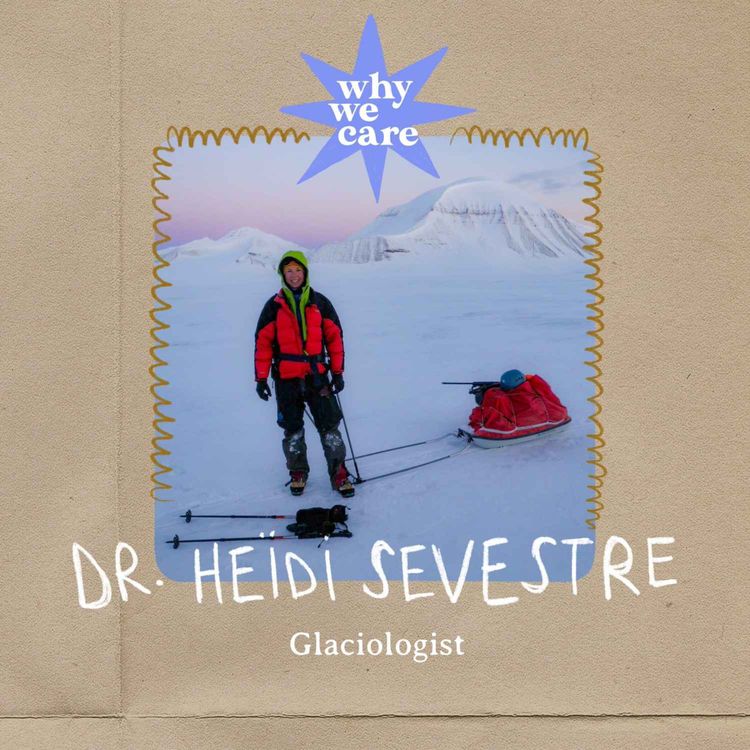
Why We Care
Is it too late to save our glaciers? with Dr. Heïdi Sevestre, glaciologist
In today’s episode I’m speaking with Heïdi Sevestre, an amazing French glaciologist. She called me all the way from Svalbard, an archipelago in the Arctic ocean, between mainland Norway and the North Pole. 10 years ago, as Heidi was hiking from Chamonix to Zermatt, a mountain guide told her that it is possible to spend your life studying glaciers, and become a glaciologist. So she’s never looked back and has since studied glaciers all around the world, from the French Alps to Greenland, from the Arctic to Antarctica.
We spoke about why are glaciers important and their role in regards to regulating the climate, but also what exactly is happening to them and whether or not it is too late to save them. She also told me about a climbing expedition in Greenland she recently went on called Arctic Ascent, which was filmed and is currently being released on National Geographic TV.
Want to dive deeper?
- Heïdi’s book, “Sentinelle du Climat” (in French) — https://www.harpercollins.fr/collections/automated-collection/products/sentinelle-du-climat
- Heïdi’s website — https://www.heidisevestre.com/
- Ice & Life — https://www.iceandlife.com/index.php/en/
- Calculate your carbon footprint — https://footprint.wwf.org.uk/
- Watch Arctic Ascent — https://www.nationalgeographic.com/tv/shows/arctic-ascent-with-alex-honnold
Come say hi!
- Heïdi on Instagram - https://www.instagram.com/heidisevestre
- Why We Care on Instagram - https://www.instagram.com/whywecarepodcast/
- Tiphaine on Instagram - https://www.instagram.com/tiphainemarie_/
If you enjoyed the episode and want to help the podcast, I would be super grateful if you could leave a little review or share it with a friend who might like it. Thank you so much for caring and sending you lots of love!
More episodes
View all episodes
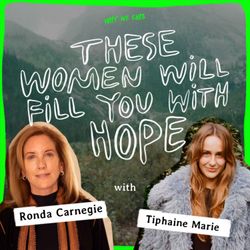
3. These women will fill you with hope, with Ronda Carnegie, Co-Founder of Project Dandelion
36:07||Season 4, Ep. 3In today’s episode I’m speaking with Ronda Carnegie, the Executive Director and Co-Founder of Project Dandelion, a global women-led climate campaign that amplifies the leadership of those most impacted by the climate crisis and most equipped to drive change. Ronda was also previously part of the original executive team at TED, where she helped transform the organisation from a single conference into a global media company.We spoke about her approach to leadership and how to overcome imposter syndrome, and she also shared why the dandelion was chosen as a symbol for her organisation, and the stories of the women she works with all around the globe. This episode is filled with hope, solutions and optimism - hope you will enjoy listening to it! Thanks so much for tuning in!------------------Want to dive deeper?Projet Dandelion’s website – https://www.projectdandelion.com/ Follow Project Dandelion on Instagram – https://www.instagram.com/projdandelion/ Subscribe to the Dandelion Digest newsletter – https://mailchi.mp/projectdandelion/dandelion-digest Let’s keep in touchSubscribe to my newsletter – https://whaleswolves.substack.com/subscribe Why We Care on Instagram – https://www.instagram.com/whywecarepodcast/ Tiphaine on Instagram – https://www.instagram.com/tiphainemarie_/ ------------------If you enjoyed the episode and want to help the podcast, I would be super grateful if you could leave a little review or share it with a friend who might like it. Thank you so much for tuning in and sending you lots of love!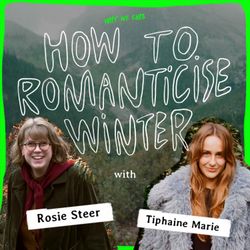
2. How to romanticise winter with Rosie Steer, Author of Slow Seasons
33:24||Season 4, Ep. 2In today’s episode I’m speaking with Rosie Steer, an author and photographer based in Edinburgh. A few years ago I came across Rosie’s book in my local bookshop and ever since it has become one of those comfort books I keep going back to. The book is an invitation to reconnect with the natural world and align with the rhythms of the seasons and the Celtic Wheel of the Year. It is filled with reflections as well as craft ideas, recipes and seasonal celebrations inspired by ancient traditions. When I was planning this new season of the podcast I felt like an episode with Rosie would be perfect for this time of year - as I personally always long for more balance between the busy, festive days of December and the long, quieter winter months that follow. Rosie shared her advice on how to slow down and align with the seasons, but also how to honour and make the most of the colder months - how to romanticise winter and bring light into the darkness.Recording this conversation was so comforting and cosy, so I hope you will enjoy listening to it! Make yourself a cup of your favourite tea and wrap yourself in a warm blanket before we dive in!! Happy holidays and see you in the new year, sending love <3------------------Want to dive deeper?Follow Rosie on Substack – https://everythinglooksrosie.substack.com/ (subscribe to her monthly newsletter or join her paid community for weekly updates: seasonal recipes, crafts and activities)Follow Rosie on Instagram – https://www.instagram.com/everythinglooksrosie Rosie’s website – https://www.everythinglooksrosie.com/ (find out more about seasonal gatherings and slow living writing archive)Buy the book – https://m.shortstack.page/ZnCx49 Let’s keep in touchSubscribe to my newsletter – https://whaleswolves.substack.com/subscribe Why We Care on Instagram – https://www.instagram.com/whywecarepodcast/ Tiphaine on Instagram – https://www.instagram.com/tiphainemarie_/ ------------------If you enjoyed the episode and want to help the podcast, I would be super grateful if you could leave a little review or share it with a friend who might like it. Thank you so much for tuning in and sending you lots of love!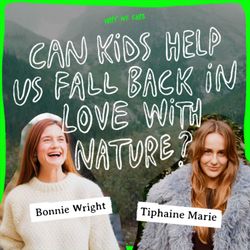
1. Can kids help us fall back in love with nature? with Bonnie Wright, Actress, activist and founder of Hello Earthling
42:54||Season 4, Ep. 1In today’s episode I’m speaking with actress and activist Bonnie Wright – we discussed her new project, Hello Earthling, a platform that focuses on helping children foster their relationship with nature and never let go of their sense of wonder and playfulness. We talked about how being around kids can remind us to take ourselves less seriously and use our imagination. Bonnie also shared memories from her own childhood, and reflected on the evolution of her activism throughout the years. I hope you will enjoy listening to this conversation as much as we enjoyed recording it!------------------Want to dive deeper?Follow Hello Earthling on Instagram – https://www.instagram.com/helloearthling/ Listen to the Hello Earthling podcast – https://open.spotify.com/show/2JXqHIk2i47JHEtT68BmAi?si=b24c531d094947fd Subscribe to Hello Earthling on Substack – https://helloearthlingworld.substack.com/ Bonnie on Instagram – https://www.instagram.com/thisisbwright/ ------------------Let’s keep in touchSubscribe to my newsletter – https://whaleswolves.substack.com/subscribe Why We Care on Instagram – https://www.instagram.com/whywecarepodcast/ Tiphaine on Instagram – https://www.instagram.com/tiphainemarie_/ ------------------If you enjoyed the episode and want to help the podcast, I would be super grateful if you could leave a little review or share it with a friend who might like it. Thank you so much for tuning in and sending you lots of love!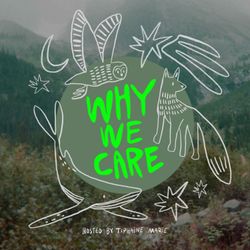
SEASON 4 trailer
05:09||Season 4, Ep. 0Why We Care is back for a new season! Thank you so much for tuning in, and see you very soon with new episodes. Subscribe to my newsletter – https://whaleswolves.substack.com/subscribe Why We Care on Instagram – https://www.instagram.com/whywecarepodcast/ Tiphaine on Instagram – https://www.instagram.com/tiphainemarie_/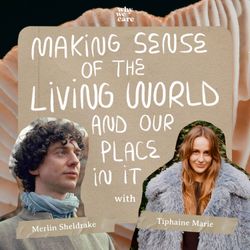
7. Making sense of the living world and our place in it with Merlin Sheldrake, Biologist and Author of Entangled Life
26:47||Season 3, Ep. 7In today’s episode I’m speaking with Merlin Sheldrake, Biologist and Author of one of my all time favourite books, Entangled Life. Merlin received a Ph.D. in tropical ecology from Cambridge University for his work on underground fungal networks in tropical forests in Panama. His research ranges from fungal biology to the history of Amazonian ethnobotany, and he is fascinated by the relationships that arise between humans and more-than-human organisms. His book, Entangled Life, is a New York Times and Sunday Times bestseller, has been translated into thirty-two languages and sold more than a million copies worldwide.Reading it a few years ago absolutely blew my mind. Never before had I read something so poetic yet informative, and since then my relationship with nature has evolved to be much more profound. It’s a book about how fungi make our worlds, change our minds and shape our futures – but also an exploration of the living world and our place in it. If you haven’t read it yet I can highly recommend it — whether you have an existing interest in fungi or not, it will turn your world upside down!The book was actually one of the reasons why I decided to launch the podcast - so it felt quite surreal to record a conversation with Merlin! A few of the things we spoke about include what drew him to the world of fungi, his work at the intersection of science and art, and also how to cultivate a relationship with organisms that feel incredibly different from us, such as fungi. We also discussed hope and what we can learn from other species to find a way forward. I hope you’ll enjoy it!Want to dive deeper?Merlin’s website — https://www.merlinsheldrake.com/Get Entangled Life — https://www.worldofbooks.com/en-gb/products/entangled-life-book-merlin-sheldrake-9781784708276Merlin on Instagram — https://www.instagram.com/merlin.sheldrakeSubscribe to the Why We Care newsletter on Substack (thank you so much!!!)Subscribe here — https://whywecare.substack.com/Come say hi!Why We Care on Instagram — https://www.instagram.com/whywecarepodcast/Tiphaine on Instagram — https://www.instagram.com/tiphainemarie_/If you enjoyed the episode and want to help the podcast, I would be super grateful if you could leave a little review or share it with a friend who might like it. Thank you so much for caring and sending you lots of love!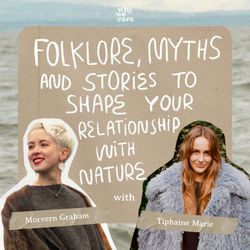
6. Folklore, myths and stories to shape your relationship with nature with Morvern Graham, Storyteller and Illustrator
44:20||Season 3, Ep. 6In today’s episode I’m speaking with Morvern Graham, a storyteller, illustrator and printmaker. I first found out about her work and art through Instagram, and was pretty much instantly drawn into her magical universe filled with mythical creatures, fairies and inspiring folk tales from her native Scotland and beyond. Once you’re done listening to this episode I invite you to go take a look at her work on her Instagram account.I’m so happy we got to record this conversation, it’s a super cosy one so go make yourself a cup of tea and find a relaxing spot to listen to it! Morvern told me some of her favourite stories, and we also spoke about how she managed to take her childlike sense of wonder with her into adulthood. She also shared how she finds and collects folk tales, how these stories have shaped her relationship with nature, and how she practices imagination and creativity in her every day life. One thing she said that has stayed with me ever since we spoke was a piece of advice she received from her dad to keep her connection with the natural world alive. I’ll let you discover this for yourself towards the end of the episode, it’s such a good one!Want to dive deeper?Follow Morvern on Instagram — https://www.instagram.com/morvern.studiosFollow Morvern on TikTok — https://www.tiktok.com/@morvern.graham Check out the Map of Stories — https://mapofstories.scot/Morvern’s website — https://www.morverngraham.co.uk/Subscribe to the brand new Why We Care newsletter!!! (thank you so much)Subscribe to the newsletter — https://whywecare.substack.com/Come say hi!Why We Care on Instagram — https://www.instagram.com/whywecarepodcast/Tiphaine on Instagram — https://www.instagram.com/tiphainemarie_/If you enjoyed the episode and want to help the podcast, I would be super grateful if you could leave a little review or share it with a friend who might like it. Thank you so much for caring and sending you lots of love!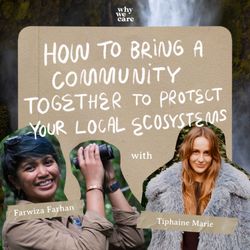
5. How to bring a community together to protect your local ecosystems with Farwiza Farhan, Forest Conservationist
29:19||Season 3, Ep. 5In today’s episode I’m speaking with Farwiza Farhan, an amazing forest conservationist working to protect and restore the Leuser ecosystem on the island of Sumatra in Indonesia – the last place on Earth where tigers, elephants, rhinos and orangutans still roam together in the wild. Farwiza has been campaigning to protect it for years, and it was so interesting to hear more about how she approaches conservation and how she collaborated with the communities who live in the area to get their voices heard and protect this precious ecosystem. She also shared why it matters to protect entire ecosystems rather than a few charismatic species, as well as her tips to start making change happen in your own community, and what gives her hope – a much needed reminder in today’s world.Want to dive deeper?Follow Farwiza on Instagram — https://www.instagram.com/wiiiiza/Check out her organisation HAkA — https://haka.or.id/Subscribe to the brand new Why We Care newsletter (thank you so much!)Subscribe to the newsletter — https://whywecare.substack.com/Come say hi!Why We Care on Instagram — https://www.instagram.com/whywecarepodcast/Tiphaine on Instagram — https://www.instagram.com/tiphainemarie_/If you enjoyed the episode and want to help the podcast, I would be super grateful if you could leave a little review or share it with a friend who might like it. Thank you so much for caring and sending you lots of love!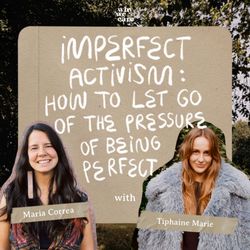
4. Imperfect activism: how to let go of the pressure of being perfect with Maria Correa, VP of Marketing & Editorial at WaterBear
30:16||Season 3, Ep. 4In today’s episode I’m speaking with Maria Correa, the VP of Marketing & Editorial at WaterBear, a community platform where entertainment meets impact. You might remember WaterBear from one of the very first episodes of season one with Poppy Mason-Watts – it’s an amazing streaming platform with lots of really cool environmental and social documentaries, all accessible for free.Today I wanted to speak with Maria about what I think is an increasingly important topic - imperfect activism. I know lots of you care about the environment and are doing your best to live in an ethical and respectful way. I do too, and yet. I’ll be the first to admit that as much as I care about the environment sometimes I do still fly, sometimes I forget my reusable water bottle and need to buy a plastic one, sometimes I buy things from companies that are not very ethical. I don’t think that means I don’t care. I don’t think this should stop me from speaking up about the issues I care about.As the saying goes, we don’t need 100 perfect environmentalists, we need millions of people doing it imperfectly. I wanted to record this episode because I feel like a lot of us are feeling that way and I don’t think we should let the pressure of being perfect prevent us from standing up for what we believe in. Maria has done a lot of research around this, and the idea of brining together a community of imperfect activists is at the heart of WaterBear. So we spoke about what it means, but also the negative stereotypes that tend to be associated with activism, and the importance of approaching environmental action through the things you love, so that it can bring you joy. Maria also shared her tips on how to handle challenging conversations around these often very emotionally charged topics. I really hope this episode will be helpful!Want to dive deeper?Check out WaterBear — https://www.waterbear.com/This month’s Collective Mission: Fashion — https://www.waterbear.com/missions/fashionCome say hi!Why We Care on Instagram — https://www.instagram.com/whywecarepodcast/Tiphaine on Instagram — https://www.instagram.com/tiphainemarie_/If you enjoyed the episode and want to help the podcast, I would be super grateful if you could leave a little review or share it with a friend who might like it. Thank you so much for caring and sending you lots of love!
3. Can we still coexist peacefully with the wild? with Jacob Dykes, Conservation Manager at The European Nature Trust
47:34||Season 3, Ep. 3In today’s episode I’m speaking with Jacob Dykes, the Conservation Manager of The European Nature Trust - a foundation that works to lift conservation and nature restoration projects in Europe, supporting a network of organisations working at landscape-scale to protect and restore ecosystems. Through an approach they call ‘Noise for Nature’, they also amplify conservation storytelling by creating impactful documentary films that raise awareness and engagement with the defining issues of our time.I was really looking forward to speaking with Jacob about his conservation work in general but also more specifically about wolves. The European Nature Trust recently produced a film called The Wolf Within exploring the relationship between wolves and humans in Europe, which was released at the end of last year – just weeks before the European Commission decided to downgrade their protection status. I’ve been fascinated with wolves for as long as I can remember and really enjoyed learning more about the evolution of our relationship with them and their place in our collective imagination. Jacob and I also talked about what this relationship says about our coexistence with the wild; and what we can do to better and more equitably safeguard keystone species around us. Jacob also shared a really lovely story about seeing wolves in the wild in Italy, and an important reminder to keep practicing wonder towards the natural world.Want to dive deeper?Watch The Wolf Within: https://www.waterbear.com/campaigns/the-wolf-withinDiscover The European Nature Trust: https://theeuropeannaturetrust.com/The EU recently downgraded wolf protections in Europe: https://eeb.org/nature-under-attack-bern-convention-weakens-wolf-protection/Joint statement by 300+ civil society organisations calling for strict wolf protection to be maintained: https://eeb.org/library/joint-statement-by-300-civil-society-organisations-calling-for-strict-wolf-protection-to-be-maintained/ClientEarth’s investigation: https://www.clientearth.org/latest/press-office/press-releases/ombudsman-opens-inquiry-after-eu-trashes-wolf-protections/The European Nature Trust on Instagram: https://www.instagram.com/theeuropeannaturetrustIo Non Ho Paura Del Lupo on Instagram: https://www.instagram.com/iononhopauradellupoCome say hi!Why We Care on Instagram — https://www.instagram.com/whywecarepodcast/Tiphaine on Instagram — https://www.instagram.com/tiphainemarie_/If you enjoyed the episode and want to help the podcast, I would be super grateful if you could leave a little review or share it with a friend who might like it. Thank you so much for caring and sending you lots of love!